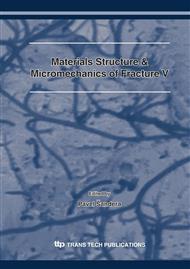p.73
p.77
p.81
p.85
p.89
p.93
p.97
p.101
p.105
The Effect of Mean Stress and Thermo-Mechanical Induced Stress on Micro-Crack Initiation: An Analysis Based on Experiments and DD Simulation Results
Abstract:
The combined effect of cyclic thermal shocks and static tensile loading is investigated, in a 304L stainless steel. During these experiments, the stress state in the cylindrical specimen walls is nearly equi-biaxial (σZZ ≈ σθθ). In dislocation dynamics (DD) simulations carried out with σZZ = σθθ, the predominant slip directions b are nearly aligned with the free surface normal vector n, regardless of their associated activation ratio (A.R.). This effect is related to the "surface connected volume" (SCV) of the predominant slip systems. Hence, surface grains with n = <110> possess "large SCV slip systems" and therefore, constitute preferential sites for micro-crack initiation in thermal fatigue. During the tests, a marked effect of the superimposed static tensile loading (or mean stress) is also noted. This effect is explained with the help of DD simulations performed with a positive mean stress: slip irreversibility in the individual persistent slip bands systematically augments with increasing mean stress.
Info:
Periodical:
Pages:
89-92
Citation:
Online since:
December 2007
Authors:
Price:
Сopyright:
© 2008 Trans Tech Publications Ltd. All Rights Reserved
Share:
Citation:


